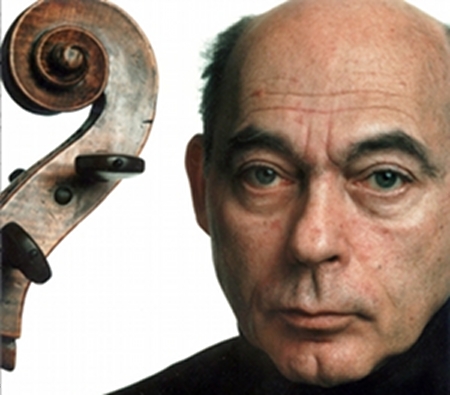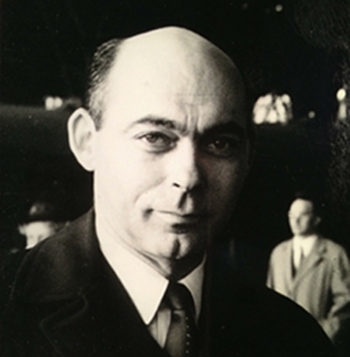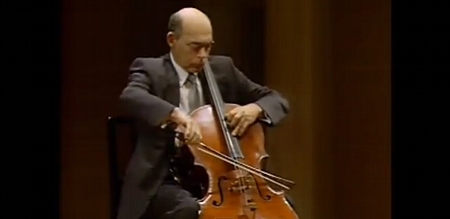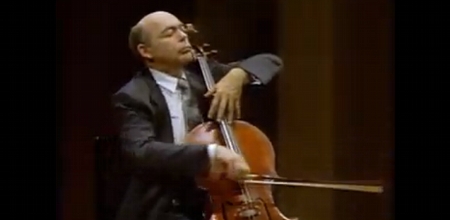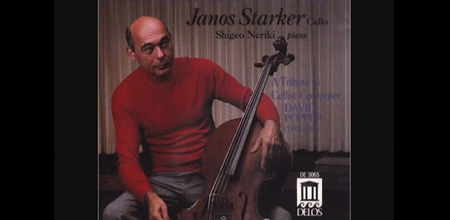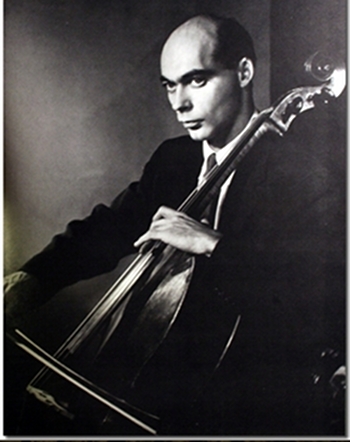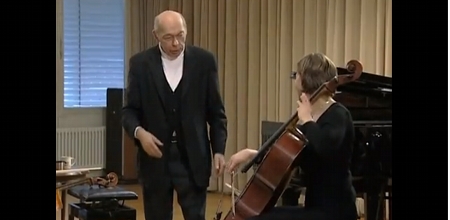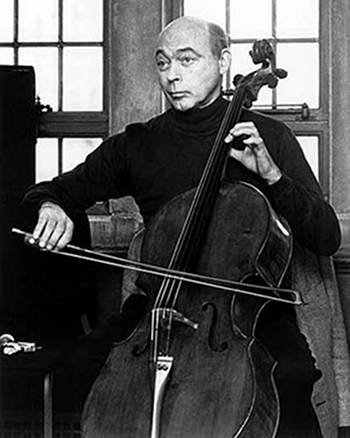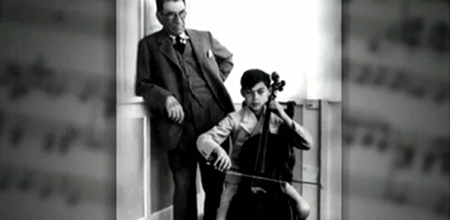THE INNER FIRE CHILLS THE AIR AROUND MESometimes the coincidences can be strange, and to times even unpleasant. The very day I came to know that my Master Luigi Milani had passed away I received a phone call, from a friend who I hadn't heard from for a while, he too had a master who had recently passed away. We had a long talk, remembering unique and happy pieces of life in contact with uncommon humanity, therefor I decided to dedicate a simple thought to my teacher, and proposed my friend to write something about his.
Thank you Jakob, it is a beautiful gift. Paolo
Dedication to the cellist Janos Starker (Budapest, july 5, 1924 - Bloomington/Indiana april 28, 2013) Short biography: Child prodigy, at the age of 11 years he enters the Franz Liszt - Academy of his native town. He studies cello with Adolf Schiffer, a pupil of David Popper, chamber music with Leo Weiner, and is influenced by the presence of Béla Bartók and Zoltán Kodály. At the age of 12, he has already five students, at 14 he plays the Dvorák celloconcerto at 3 hours notice, and at 15 he plays in public the Solosonata op. 8 by Kodály, considered unplayable. In 1945 he becomes principle cellist of the Budapest Opera and the Budapest Philharmonic Orchestra. In 1946 he emigrates to Paris where he records the Solosonata by Kodály, obtaining the "Gran Prix du Disque". In 1948 he moves to the USA and becomes principle cellist of the Metropolitan Opera in New York, and later holds the same position at the Chicago Symphony Orchestra conducted by Fritz Reiner.
Janos Starker in Cologne in 1958 (photo by Ingeborg Haarer Ludwig) In 1958 he is called to what will be in his own view the principle activity for the rest of his life: being part of the faculty of the Indiana University Jacobs School of Music in Bloomington. He also resumes his career as a soloist, playing thousands of concerts in every continent, and making 175 recordings. Apart from the numerous audio and video recordings which document his extraordinary skill and mastery, his artistic nature and the depth of his thinking emerge through many of his statements and of course through his teaching, which always was his most important commitment. "My musical trinity: Unity, purity, balance"
Janos Starker - Kodály Cello Solo Sonata I. Mvt (click to watch the video) "Freedom comes from discipline, not freedom first with discipline imposed on top. When discipline does not underlie every aspect of your work, it becomes simply musical or artistic anarchy. Disciplined performance strives for purity and simplicity, not for mere effect." "I am deadly serious about what I do in music, but not about myself."
Janos Starker - Kodály Solo Sonata - 3rd Mvt. (click to watch the video) "I am not sentimental, I am emotional", or as he used to say during his lessons: "Don't get excited, create excitement." "I cannot allow for myself the luxury of playing badly if I don't feel well. Every time I am on stage and people come and make the effort to hear me, I am obliged to give my very best. Their being there honors me."
Janos Starker - David Popper: Dance of the Elves (click to listen) "I am lucky to be gifted, but I feel also responsible having to use my gift in the best way, to reach the utmost." Comparing his activity as a soloist with his teaching, he said: "When you take charge of a young person whose entire life depends on what you do, it is a huge responsability and in the long run more important."
In his classroom In spite of his very demanding commitment as a soloist, we had lessons with Starker every single week, often also on saturday in the auditorium, when his teachings where public for the whole school.
A lesson with Janos Starker (click to watch the video) For Starker, the most important aspect in learning to play an instrument is how to properly use the body according to physical rules of the human being. "If you use it contrary to those rules, eventually - if you are talented - you will reach heights up to a certain point, but you will damage, even destroy your body. This means that if somebody is using the muscles with excessive tension, eventually it will hurt. It will harm. It is sad to me to see instrumentalists destroying themselves through overexertion."
"A great teacher is one who cares for the individual and is willing to spend a lifetime learning the elements of every aspect of his art so he can transmit the message of the great composers." I favor the "open door policy", he said. All of his lessons were open to listen to for all the other students of the Jacobs Music School. Watching a lesson of a fellow student struggling with the same problems, you can understand better your own, identifying yourself and observing the remarks of the teacher.
Tribute to Janos Starker (click to watch the video) Starker said his job as a teacher is "to inform, to try to show my students how to use their brains", and then, through guidance, leading them through the problem and to a self - designed solution. "Too many students are taught to learn through imitation", rather than their intelligence and learning how to make the best use of their body. "I want to develop the student's hearing, so that they will be disturbed by details which haven't disturbed them before, because once you are disturbed, you will find a way to cure what's bothering you." "The teachers reward comes from making a student's imagination work. I am far less interested in talent than a student whose brain allows for continual development." His job, he says, is not as a coach: "I am a teacher. Coaching means to help students learn specific pieces. Teaching imparts principles and helps students gain the skills that will enable them to make decisions based on knowledge, on understanding."
Janos Starker - interview at the Kronberg Academy (click to watch the video) Acknowledgements: I owe to Starker my passion for the cello because he was my idol. Without him I would have never started to play. I owe to him my ethics in music. Thanks to his teachings I could become a professional musician. Thanks to his wisdom he gave me priciples for my life.
Jakob Ludwig
|
   |






